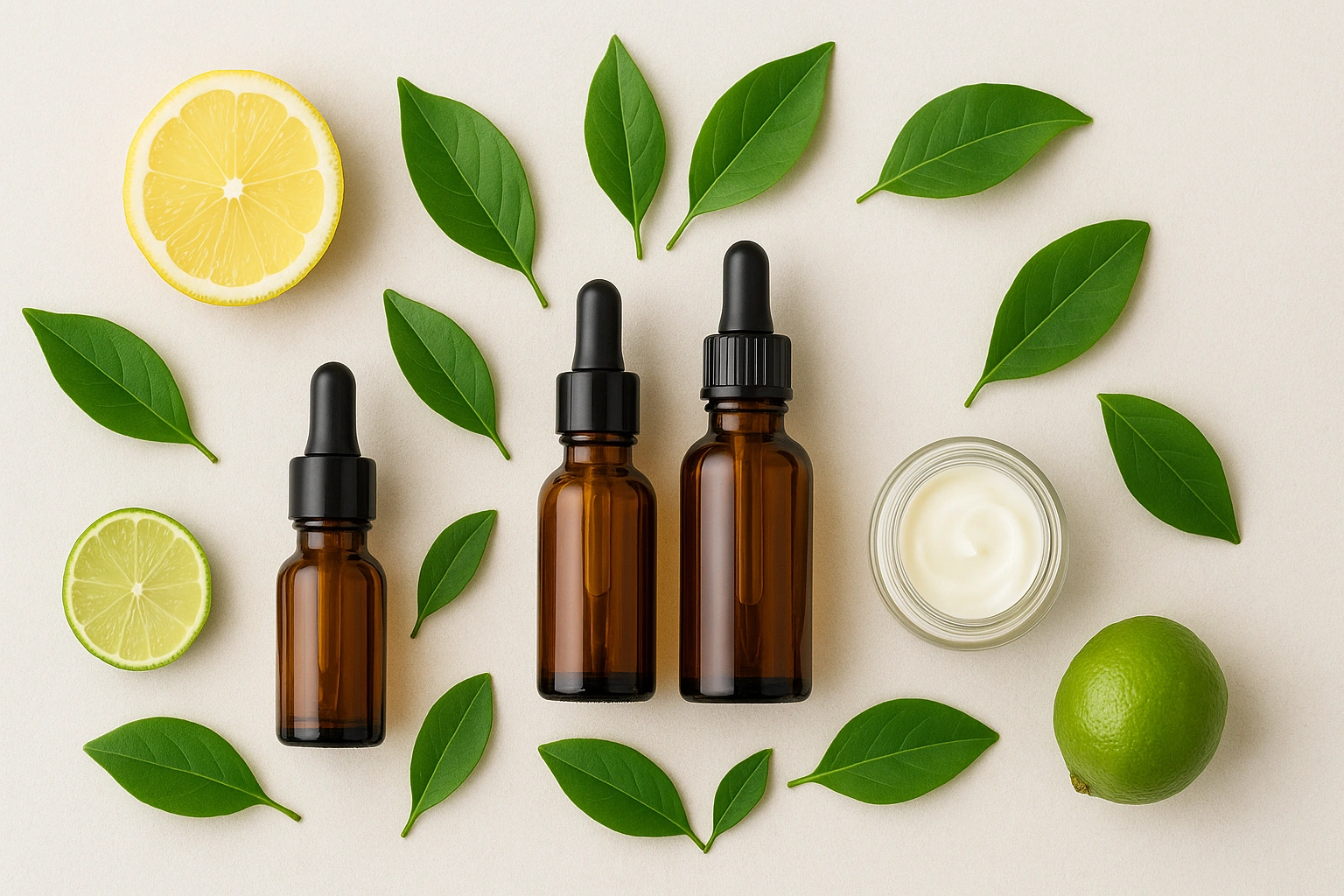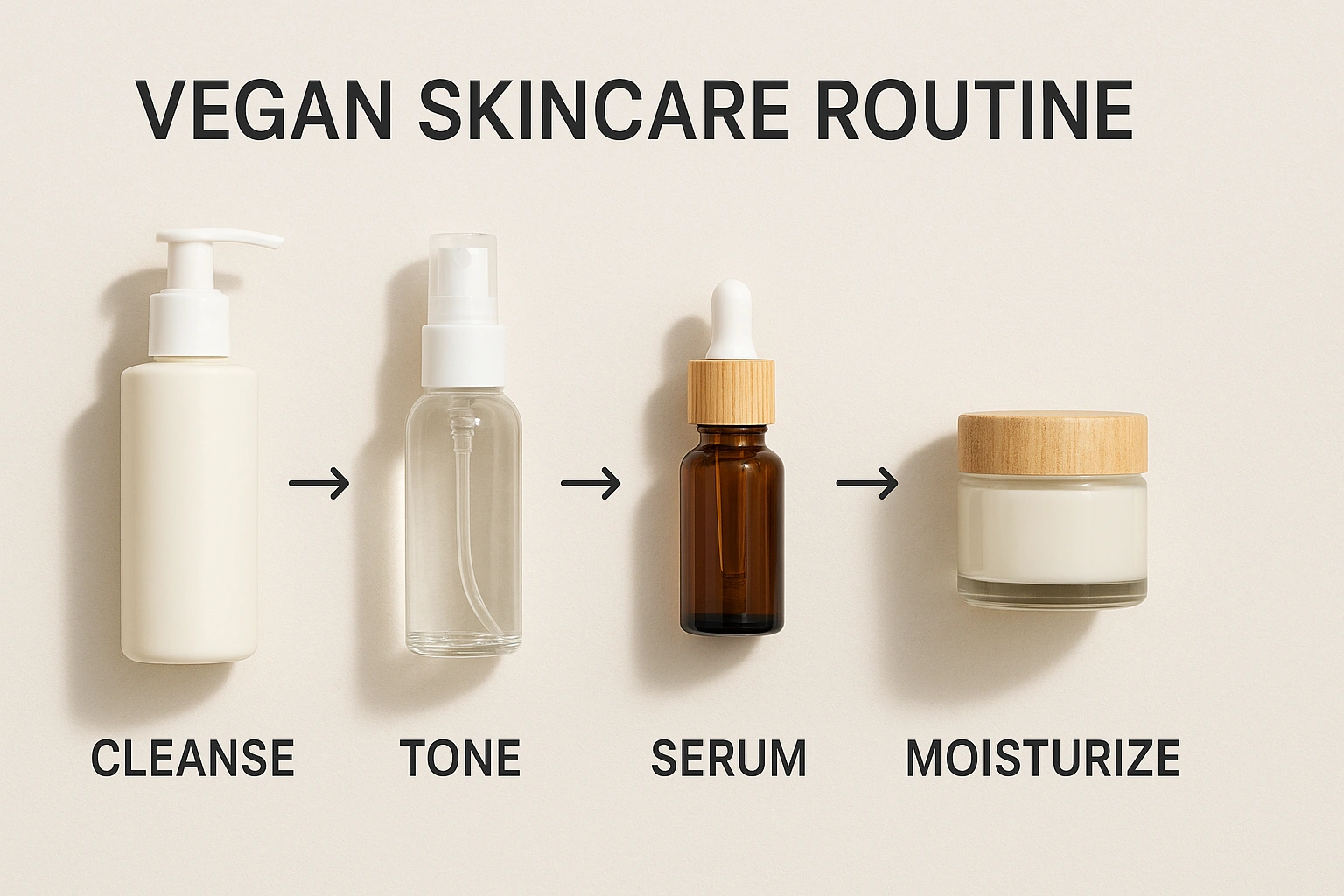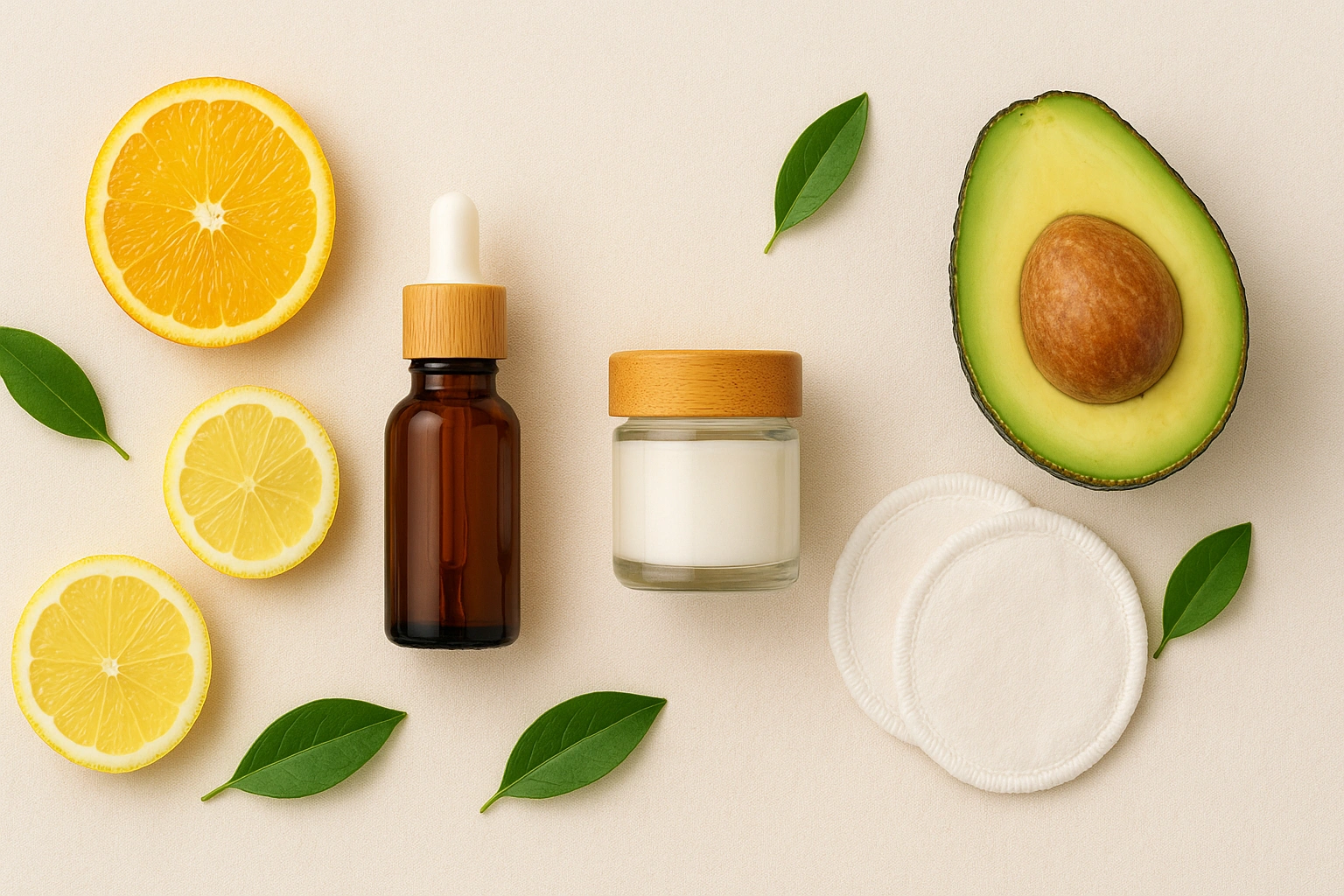Have you ever looked in the mirror and wished for that effortless, lit-from-within glow, only to be met with dull, tired-looking skin? That’s where vegan beauty tips can make a real difference in how your skin looks and feels.
You’ve tried countless products, but nothing seems to deliver that lasting radiance. In 2025, vegan beauty tips are proving that plant-based routines can be just as powerful, without relying on harsh chemicals.
The secret to luminous skin isn’t found in complex chemical formulas, but in the power of plants combined with practical vegan beauty tips that are easy to follow.
This guide is packed with actionable vegan beauty tips to help you harness nature’s best ingredients, nourish your skin, and achieve a glow that truly lasts.
- What Exactly is Vegan Beauty?
- The Benefits of a Plant-Powered Routine
- Your Morning Vegan Skincare Routine for a Natural Glow
- My 30-Day Vegan Skincare Challenge
- Comparison: Common Ingredients vs. Vegan Alternatives
- Common Mistakes to Avoid on Your Vegan Beauty Journey
- Expert Tips & Best Practices
- Frequently Asked Questions (FAQ)
- Conclusion
What Exactly is Vegan Beauty?
Vegan beauty is a skincare and makeup philosophy centered on one simple rule: no animal-derived ingredients or byproducts, and many vegan beauty tips start with this foundation.
This means products are free from common ingredients like honey, beeswax, lanolin from sheep’s wool, collagen from animals, and carmine from insects, which is why vegan beauty tips emphasize plant-based choices.
It’s a commitment to using only botanicals and synthetic-safe alternatives, and following vegan beauty tips helps ensure every step of your routine aligns with this principle.
By understanding these basics, you can apply vegan beauty tips more confidently, creating a routine that’s ethical, effective, and easy to maintain.
This movement has exploded in popularity, and it’s not just a fleeting trend. According to a report from Statista, the global vegan cosmetics market is projected to reach over $21 billion by 2027. This incredible growth shows a massive consumer shift towards ethical, clean, and plant-powered beauty solutions.

The Benefits of a Plant-Powered Routine
Adopting a vegan beauty routine isn’t just an ethical choice; vegan beauty tips show it’s also one of the best decisions for your skin’s overall health.
Plant-based ingredients are often gentler and more nutrient-dense, and vegan beauty tips highlight how these natural sources support skin without irritation.
By following vegan beauty tips, you learn to replace heavy or harsh products with lighter formulas that work in harmony with your skin.
The result of applying vegan beauty tips consistently is healthier, more radiant skin that benefits from clean, plant-powered care.
Kinder to Your Skin
Animal-derived ingredients can sometimes be heavy, pore-clogging, or irritating for sensitive skin. Vegan formulas, which rely on botanicals, are often lighter and less likely to cause breakouts or allergic reactions. They work in harmony with your skin’s natural barrier.
Rich in Antioxidants and Vitamins
Plants are nature’s powerhouses of antioxidants, vitamins, and minerals. Ingredients like Vitamin C (from citrus fruits), Vitamin E (from avocados), and antioxidants (from green tea) are central to many **organic skincare hacks**. They protect your skin from environmental damage, brighten your complexion, and promote a youthful appearance.
Better for the Planet and Animals
Choosing vegan beauty directly reduces the demand for animal agriculture, which is a major contributor to deforestation and greenhouse gas emissions. It’s a compassionate choice that ensures no animals are harmed for our vanity. For more on how technology can support a compassionate lifestyle, explore these innovations in ethical tech.
Your Morning Vegan Skincare Routine for a Natural Glow
Achieving glowing skin is about consistency. Here is a simple, effective vegan routine you can follow every morning.

- Cleanse with a Gentle Touch: Start with a sulfate-free cleanser made with soothing ingredients like chamomile or green tea to remove impurities without stripping your skin.
- Tone with Floral Waters: A spritz of rosewater or lavender water helps to balance your skin’s pH and prep it for the next steps.
- Nourish with a Vitamin C Serum: This is a non-negotiable for a radiant glow. A plant-based Vitamin C serum will brighten your complexion and protect against free radicals.
- Moisturize with Plant Butters: Lock in hydration with a moisturizer rich in shea butter, mango butter, or jojoba oil.
- Protect with Mineral Sunscreen: Always finish with a zinc-oxide-based SPF 30+ to protect your glow from sun damage.
My 30-Day Vegan Skincare Challenge
I decided to put these vegan beauty tips to the test. For 30 days, I swapped my conventional products for fully vegan alternatives. My biggest change was switching my chemically-laden face wash for a simple, oil-based cleanser and my heavy cream for a lightweight, aloe-based moisturizer.
The first week, my skin felt a little different as it adjusted. But by week three, the results were undeniable. My skin was less red, felt more hydrated, and had a noticeable brightness I hadn’t seen before. It proved to me that gentle, plant-based ingredients are incredibly effective.
| Pros | Cons | |
|---|---|---|
| Vegan Skincare | Gentler on skin, reduced redness, felt more hydrated and radiant. | Requires careful reading of labels, some niche products can be harder to find. |
Comparison: Common Ingredients vs. Vegan Alternatives
Here are some powerful plant-based alternatives to common animal-derived ingredients.
| Common Animal Ingredient | Powerful Vegan Alternative | Benefit |
|---|---|---|
| Lanolin (from wool) | Shea Butter, Cocoa Butter | Deeply moisturizing and nourishing. |
| Collagen (from animals) | Plant Peptides, Vitamin C | Helps stimulate your own collagen production. |
| Glycerin (animal fat) | Vegetable Glycerin | A powerful humectant that draws moisture to the skin. |
| Beeswax | Candelilla Wax, Carnauba Wax | Provides a protective barrier in balms and creams. |
Common Mistakes to Avoid on Your Vegan Beauty Journey
- Confusing “Vegan” with “Cruelty-Free”:** They aren’t the same! Look for both labels to be sure.
- Forgetting About Tools:** Some makeup brushes are made with animal hair. Opt for synthetic, cruelty-free brushes.
- Ignoring Hidden Ingredients:** Ingredients like squalene (can be from shark liver), gelatin, and tallow can hide in products. Always check the label.
- Thinking It’s All or Nothing:** You don’t have to replace your entire collection overnight. Start by swapping out one product at a time as you finish it.
- Overlooking Your Diet:** The ultimate glow comes from within. A diet rich in fruits and vegetables will amplify the effects of your skincare.
Expert Tips & Best Practices
Take your vegan beauty routine to the next level with these pro tips.
- Eat the Rainbow: Foods rich in antioxidants, like berries, leafy greens, and nuts, will fight inflammation and give your skin a beautiful glow.
- Look for the Logo: Trustworthy certifications from The Vegan Society are the gold standard.
- Use Fruit Enzymes for Exfoliation: Papaya and pineapple contain natural enzymes that gently dissolve dead skin cells, revealing a brighter complexion.
- Don’t Forget Your Hair and Body: Extend your vegan philosophy to your entire routine with vegan shampoos, conditioners, and body lotions.
“The future of skincare is plant-based. We’re now understanding that botanicals not only provide the same benefits as their animal-derived counterparts but often deliver them in a cleaner, more effective, and more biocompatible way.”
— Dr. Lena Hanson, Dermatologist
Frequently Asked Questions (FAQ)
Q: What’s the difference between vegan and cruelty-free beauty?
A: Cruelty-free means a product and its ingredients were not tested on animals. Vegan means the product contains no animal-derived ingredients or byproducts. A product can be one without being the other, so look for both labels for the most ethical choice.
Q: Can I get results without ingredients like collagen or retinol?
A: Yes! The plant kingdom offers powerful alternatives. Look for plant peptides to boost collagen production and bakuchiol, a natural, gentler alternative to retinol that offers similar anti-aging benefits.
Q: Is vegan skincare better for sensitive skin?
A: Often, yes. Vegan formulas tend to avoid common irritants like lanolin, dairy, and honey. They often focus on soothing botanicals, making them a great choice for sensitive or reactive skin types.
Q: Are all vegan beauty products ‘clean’ or ‘organic’?
A: Not necessarily. ‘Vegan’ only refers to the absence of animal ingredients. A product can be vegan but still contain synthetic chemicals. If you’re looking for natural formulas, check for additional certifications like USDA Organic or Ecocert.
Q: How do I know if a product is truly vegan?
A: The most reliable way is to look for a third-party certification seal from organizations like The Vegan Society or Vegan Action. If there’s no seal, carefully read the ingredient list to check for hidden animal-derived ingredients.
Conclusion
Embracing these vegan beauty tips is about more than glowing skin; it’s also about making a conscious choice to live in harmony with yourself, with animals, and with the planet.
By nourishing your skin with the vibrant, life-giving power of plants, vegan beauty tips can help unlock a natural radiance that harsh synthetic chemicals often fail to provide.
Starting small is the best approach, and vegan beauty tips encourage simple, gradual changes that feel natural and rewarding over time.
With consistency, vegan beauty tips can transform your skin from the outside in, giving you results that are lasting, ethical, and truly sustainable.
For a comprehensive list of certified vegan products, visit The Vegan Society’s website.
